In moment’s fast-paced world, chancing moments of peace and tranquility can feel like a luxury. Amidst the chaos of diurnal life, numerous people turn to pursuits as a means of relaxation and tone-care. One similar practice of gaining fashion ability for its myriad benefits is meditation. But is meditation truly a hobbyhorse? In this comprehensive companion, we’ll claw into the world of meditation, exploring its origins, ways, and benefits, and addressing common questions to help you understand why meditation is further than just a pastime it’s a transformative practice for cultivating inner peace and well-being.

Understanding Meditation
Meditation is a practice that dates back thousands of times and is set up in colorful spiritual and artistic traditions around the world. At its core, meditation involves training the mind to concentrate and deflect studies, leading to a state of heightened mindfulness, clarity, and inner calm. While meditation is frequently associated with awareness and relaxation, its benefits extend far beyond stress reduction, encompassing physical, emotional, and spiritual well-being.
Is Meditation a Hobby?
While some may view meditation as a hobbyhorse a rest exertion pursued for pleasure and relaxation it is, in substance, much further than that. meditation is a reflective practice that goes beyond bare recreation, offering a profound occasion for tone- discovery, particular growth, and inner metamorphosis. Unlike traditional pursuits that concentrate on external conditioning or interests, meditation is an inward trip that fosters a deeper connection with oneself and the world around us.
Ways of Meditation
There are multitudinous ways and approaches to meditation, each with its own unique focus and system. Some of the most common meditation practices include
1. Mindfulness Meditation: In awareness meditation, interpreters cultivate present-moment mindfulness by fastening their attention on the breath, fleshly sensations, or the unfolding of studies and feelings without judgment.
2. Transcendental Meditation: Transcendental meditation involves repeating a mantra — a word, expression, or sound still to oneself, allowing the mind to settle into a state of deep relaxation and inner peace.
3. Loving-Kindness Meditation: Loving-kindness meditation, also known as matter meditation, involves cultivating passions of compassion, love, and goodwill towards oneself and others through the reiteration of loving-kindness expressions.
4. Visualization Meditation: Visualization meditation utilizes internal imagery to elicit passions of relaxation, mending, or commission. interpreters may fantasize about peaceful scenes, positive issues, or aspects of their asked reality.
5. Body Overlook Meditation: Body checkup meditation involves totally surveying the body from head to toe, bringing mindfulness to physical sensations and areas of pressure or discomfort, and allowing them to release and dissolve.
Benefits of Meditation
The benefits of meditation are wide-ranging and well-proven, encompassing physical, internal, emotional, and spiritual aspects of well-being. Some of the crucial benefits include
- Stress Reduction: Meditation has been shown to reduce stress situations by cranking the body’s relaxation response, lowering cortisol situations, and promoting a sense of calm and equilibrium.
- Improved Mental Clarity: Regular meditation practice can enhance cognitive function, attention, and memory, leading to lesser internal clarity and focus in diurnal life.
- Emotional Adaptability: Meditation cultivates emotional adaptability by adding tone- mindfulness, regulating feelings, and fostering a lesser sense of acceptance and imperturbability towards life’s challenges.
- Enhanced Well-being: Meditation promotes overall well-being by supporting physical health, boosting vulnerable function, and reducing symptoms of anxiety, depression, and other internal health conditions.
Final Word
In conclusion, meditation transcends the boundaries of a bare hobbyhorse, offering a profound path to tone- discovery, inner peace, and well-being. Whether you are seeking stress relief, internal clarity, emotional adaptability, or spiritual growth, meditation provides a transformative practice for cultivating a deeper connection with yourself and the world around you. By exploring the ways, benefits, and common questions girding meditation, you can embark on a trip of tone- disquisition and inner metamorphosis that enriches every aspect of your life.
FAQs (constantly Asked Questions)
1. Is meditation religious or spiritual in nature?
While meditation has roots in colorful religious and spiritual traditions, it isn’t innately tied to any specific belief system. meditation can be rehearsed by people of all backgrounds and faiths as a temporal practice for promoting well-being and tone- mindfulness.
2. How long does it take to witness the benefits of meditation?
The timeline for passing the benefits of meditation can vary depending on factors such as frequency of practice, individual disposition, and the specific meditation fashion used. Some people may notice immediate benefits, while others may bear further time and thickness to witness significant changes.
3. Can anyone meditate, or is it only for certain personality types?
Meditation is a practice that’s accessible to anyone, any personality type or background. While some individuals may find certain meditation ways more suited to their preferences or disposition, there are numerous different approaches to meditation, allowing for inflexibility and customization to individual requirements.
4. How frequently should I meditate to witness the benefits?
The frequency of meditation practice can vary depending on particular preferences, life factors, and pretensions. While diurnal meditation is ideal for establishing a harmonious practice and maximizing benefits, indeed short, regular sessions can yield positive results over time.
5. Can meditation be used as a form of remedy or tone-care?
Yes, meditation can be an important tool for tone care and remedial mending. numerous internal health professionals incorporate awareness-grounded interventions, similar to awareness- grounded stress reduction (MBSR), or awareness-ground cognitive remedy (MBCT), into their treatment approaches to address a wide range of internal health enterprises.


